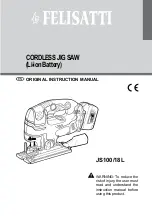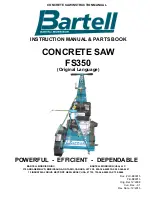
19
GB
O R I G I N A L I N S T R U C T I O N S
Grab the power saw in both hands by the handle and the additional handle (XII).
Use your thumb to move up and hold the power switch lock in this position. This will allow you to lower the power saw body and
press the power switch. Press the power switch to switch the tool motor on. After starting the motor, release the pressure on the
lock button. The power switch cannot be locked in the o
ff
position.
After switching the power saw on, keep it freely and check the uniformity of the operation with hearing. In the event of any suspi-
cious sounds, cracks, etc., stop work immediately and repeat the steps indicated in chapter “Preparing for operation”.
Apply the power saw base to the workpiece surface in such a way that the saw blade does not touch the workpiece.
Guide the power saw along the cutting line so that the power saw base has contact with the surface of the workpiece.
After pressing the power switch, allow the saw blade to reach the rated rotational speed and only then start cutting. It is forbidden
to
fi
rst apply the saw blade to the workpiece and then start the tool. This can jam or damage the saw blade or cause damage to
the workpiece. This can lead to injuries.
When resuming cutting, let the saw blade reach its rated rotational speed and then insert it into the cut.
When cutting, the saw blade should be guided with a smooth motion, avoiding excessive pressure. The pressure to be exerted
on the cutting head should not be greater than that which is su
ffi
cient to cut the workpiece. Avoid hitting the workpiece with the
saw blade.
If the saw blade blocks in the workpiece, switch the power saw o
ff
immediately by pressing the lock button and the electrical power
switch and only then withdraw the power saw. During cutting, pay special attention to the possibility of slipping or kickback of the
power saw and therefore the risk of accident. When working, do not exert too much pressure on the workpiece and do not make
sudden movements in order not to damage the saw blade and the power saw. Take regular breaks during work.
Do not overload the tool, the temperature of the external surfaces must never exceed 60°C.
After
fi
nishing work, switch o
ff
the power saw, unplug the tool cable from the power socket and perform maintenance and inspection.
The declared total vibration value has been measured using the standard test method and can be used to compare one tool to
another. The declared total vibration value can be used in the initial exposure assessment.
Caution! The vibration emission during tool operation may di
ff
er from the declared value, depending on the manner the tool is used.
Caution! Safety measures to protect the operator, which are based on an assessment of exposure under actual conditions of
use (including all parts of the work cycle, such as the time when the tool is switched o
ff
or idle and the activation time), must be
speci
fi
ed.
MAINTENANCE AND OVERHAUL
ATTENTION! Before any adjustment, technical service or maintenance operations unplug the tool. Once the operations have been
fi
nished, the technical conditions of the tool must be assessed by means of external evaluation and inspection of the following
elements: body and handle, conductor with a plug and de
fl
ection, functioning of the electric switch, patency of ventilation slots,
sparking of brushes, noise level of functioning of bearings and gears, start-up and smoothness of operation. During the guarantee
period, the user cannot dismantle the electric tools or change any sub-assemblies or elements, since it will cancel any guarantee
rights. All irregularities detected at overhaul or during functioning of the tools are a signal to have the tool repaired at a service
shop. Once the functioning has been concluded, the casing, ventilation slots, switches, additional handle and protections must be
cleansed with a stream of air (at a pressure not exceeding 0.3 MPa), with a brush or a cloth without any chemical substances or
cleaning liquids. Tools and handles must be cleansed with a clean cloth.
Summary of Contents for YT-82168
Page 28: ...28 RUS residual current device RCD...
Page 29: ...29 RUS...
Page 30: ...30 RUS...
Page 31: ...31 RUS 1 EN847 1 II 0 3 III IV 5 5 V 2 VI VII 0 45O 0O 45O VIII IX...
Page 32: ...32 RUS YT 82169 YT 82169 YT 82169 YT 82169 XI XII...
Page 33: ...33 RUS 60 C 0 3 MPa...
Page 35: ...35 UA residual current device RCD...
Page 36: ...36 UA...
Page 37: ...37 UA 1...
Page 39: ...39 UA XII...
Page 40: ...40 UA 60O C 0 3 MPa...
Page 106: ...106 GR RCD RCD...
Page 107: ...107 GR...
Page 108: ...108 GR...
Page 109: ...109 GR...
Page 110: ...110 GR 1 cm...
Page 112: ...112 GR XII...
Page 113: ...113 GR 60 o C 0 3 MPa...
















































